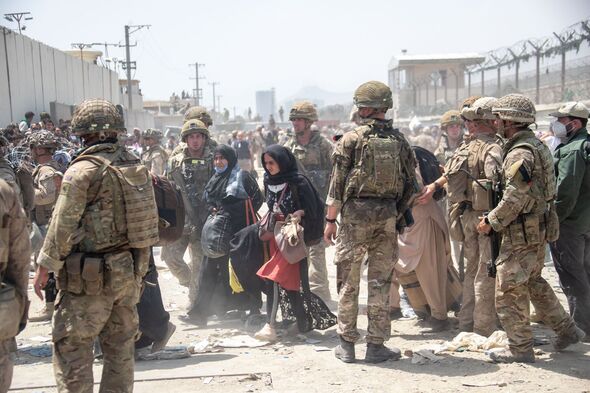
The evacuation of Kabul would serve as the blueprint for the evacuation of Lebanon (Image: Getty)
The prospect of war between Israel and the Lebanese paramilitary group Hezbollah looks if not inevitable, then highly likely following an escalation in the ongoing conflict in recent weeks.
With it, the likelihood of Israel being drawn into a regional conflict with Hezbollah backers Iran becomes a more realistic possibility with war between two of the region’s biggest powers having global ramifications.
The ramifications would be far-reaching and significant, with its impact being felt from London to Washington to Kyiv.
But if the war that nobody wants does turn into a peer-on-peer conflict, just how will the UK respond?
Express.co.uk’s Conor Wilson, who served in the British Army from 2016-23, runs through what would likely happen.

There has been an uplift in violence between Israel and Hezbollah in neighbouring Lebanon (Image: Getty)
1. Evacuate British citizens
The first thing to note is that over 2,000 British citizens are currently in Lebanon despite government warnings for them to leave.
War in the region would see commercial flights in and out of Lebanon grounded.
Bordered by Israel and Syria, ground routes to safety would be non-existent, leaving the UK little choice but to deploy troops to evacuate those left behind.
The UK military has the means and capability to conduct rapid evacuations from war zones and recent experience of doing so. Next week marks the three-year anniversary of the evacuation of Kabul, one of the military’s most successful operations this decade and something that has been conducted more recently in Sudan last year.
Troops from 16 Air Assault Brigade supplemented by others would likely be the ones tasked with any evacuation, with elements of the brigade constantly held on high readiness for short notice deployments across the world.
Any mission would be helped by the significant British military presence in Cyprus which provides a logistical hub to support the deployment of UK troops in the Middle East and Africa for extended periods of time.
2. Protect vital shipping routes
Even in the event of conflict, the UK or other western nations will not be drawn into the deployment of personnel to aid Israel.
To do so would be to escalate the conflict from a regional one to a global one.
But the military would have a role to play.
We have seen the RAF conduct strikes against Iranian backed Houthis in the Red Sea to prevent the disruption of vital shipping lanes and it is likely that any attempt by Iranian backed forces to restrict global shipping would be met with a similar response.
There would also likely be military support similar to what has been given to Ukraine in the form of training, mentoring and intelligence sharing.

Iranian backed pirates were targeted by the RAF whilst attempting to disrupt global shipping (Image: Getty)
3. Supply of weapons
But the most crucial aspect to the outcome of the conflict would likely come from the contribution of the UK and US to the supply of weapons to ensure that Israel if not prevail, do not lose.
The issue of support to Israel has been something of a minefield for Labour ever since October 7th. The party’s history of antisemitism coupled with Keir Starmer’s bungled attempts to articulate the lengths he believes Israel should be able to go to defend itself has made it vulnerable point of attacks for opposition parties.
A surge of support for Gaza since Israel launched its assault has complicated things further, especially in an election year.
But if the UK’s ally Israel was to become engaged in armed conflict with Russia and China’s largest Middle Eastern puppet, the high stakes involved would leave the government with little option but to back Israel to ensure that if it cannot win outright, it doesn’t lose.

The response to the Israel-Gaza conflict has been influenced by the surge of support for Palestine (Image: Getty)
Yet in this there is a balance to be struck. Considerable stockpiles have already been sent to Ukraine and the British Army’s lack of ammunition stockpiles is one of the worst kept secrets in NATO.
Any uplift in support to Israel would have to come at the expense of aid to Ukraine forcing military chiefs and political leaders into a Sophie’s choice-like decision.
Ukraine has already suffered since October 7th as the developing conflict in Gaza has seen much needed weaponry diverted from Kyiv to Tel-Aviv, contributing towards significant Russian territorial gains in Ukraine.
The west continues to call for calm. On Monday, US president Joe Biden convened a meeting of his senior national security team to discuss concerns over the potential for escalation following the assassination of Hamas’ political leader Ismail Haniyeh in Tehran.
Yet it is becoming increasingly unclear just how much (or little) sway outside countries have in their attempts to mediate and reduce tensions. The US and Qatar have worked with Israel and Hamas to try in vain to agree terms of a ceasefire whilst Russia has little incentive to encourage a scaling back of Iranian military action across the region.
The Middle East has not been this close to regional conflict since the Yom Kippur war of 1973 and whilst politicians speak of a “roadmap to peace”, the path has rarely been less clear. With tensions riding high and the region on the brink, the UK and its allies must prepare for how they will respond to further escalation.
